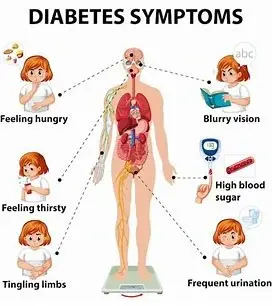Last updated on May 28th, 2025 at 03:33 pm
“Discover 7 practical and effective tips to control diabetes and manage blood sugar levels naturally, from diet to daily habits, find examples that make living with diabetes easier.”
Introduction
Diabetes is a long-term condition that affects millions of people worldwide. It requires careful management to avoid complications and stay healthy. Diabetes is characterized by high blood sugar levels, which can harm the heart, kidneys, eyes, and nerves if not properly controlled.
Managing diabetes effectively is essential for overall well-being. By keeping blood sugar levels within target ranges, you can lower the risk of serious health problems and lead a better life. A healthy lifestyle plays a big part in this process.
In this article, we will discuss **7 practical tips** to effectively manage diabetes:
1. Embrace a balanced diet
2. Practice portion control
3. Stay active with regular exercise
4. Manage stress levels effectively
5. Monitor blood sugar levels regularly
6. Prioritize quality sleep for better insulin sensitivity
7. Stay hydrated throughout the day
We include real-life examples to illustrate how these strategies can be implemented successfully.
1. Embrace a Balanced Diet
A balanced diet is crucial for effectively managing diabetes. Making mindful food choices can stabilize blood sugar levels and provide essential nutrients for overall health.
Importance of a Balanced Diet in Diabetes Management
A balanced diet ensures that you get the right mix of carbohydrates, proteins, fats, vitamins, and minerals. For individuals with diabetes, this balance is vital to maintain stable blood sugar levels and prevent complications. Foods rich in essential vitamins like fruits and vegetables are particularly beneficial.
Choosing Healthier Carbohydrates
Selecting the right type of carbohydrates is key to managing blood sugar levels. Opt for:
* **Whole Grains**: Brown rice, quinoa, and whole-wheat bread.
* **Fruits**: Apples, berries, and pears.
* **Vegetables**: Leafy greens, carrots, and bell peppers.
These choices help maintain stable blood sugar levels without causing spikes.
Sample Meal Plan
Here’s an example of a balanced meal plan to illustrate how you can incorporate healthy choices throughout the day:
**Breakfast**
* Oatmeal topped with fresh berries and a sprinkle of chia seeds
* A boiled egg for protein
* A glass of water or unsweetened herbal tea
**Lunch**
* Grilled chicken salad with mixed greens, cherry tomatoes, cucumbers, and a light olive oil dressing
* A small serving of quinoa
* A piece of fruit like an apple or orange
**Dinner**
* Baked salmon with a side of steamed broccoli and sweet potatoes
* Mixed vegetable stir-fry with tofu
* A handful of unsalted nuts as a snack later in the evening
**Snack Options**
* Greek yogurt with a drizzle of honey
* A small handful of almonds or walnuts
* Fresh carrot sticks with hummus
By adopting these dietary habits, you can enjoy diverse meals while effectively managing your diabetes.
2. Practice Portion Control
Maintaining appropriate portion sizes is critical in managing diabetes effectively. By controlling the amount of food you consume, you can better manage your blood sugar levels and avoid spikes.
Techniques for Effective Portion Control
Implementing portion control doesn’t have to be complicated. Here are some practical techniques:
* [**Use Smaller Plates**](https://www.diabetes.org.uk/guide-to-diabetes/enjoy-food/eating-with-diabetes/portion-sizes): Opt for smaller plates or bowls to naturally reduce the amount of food you serve yourself.
* [**Measure Your Food**](https://www.healthline.com/nutrition/portion-control): Invest in kitchen scales or measuring cups to accurately measure portions, especially for high-carb foods.
* [**Mindful Eating**](https://www.niddk.nih.gov/health-information/weight-management/just-enough-food-portions): Pay attention to your body’s hunger cues and eat slowly to avoid overeating.
* [**Carb Counting**](https://diabetes.org/food-nutrition/understanding-carbs/carb-counting-and-diabetes): Be mindful of the carbohydrates in each meal and track them to stay within your daily limits.
Real-Life Example
Consider Sarah, a 45-year-old woman diagnosed with type 2 diabetes. By adopting portion control techniques, she managed her diabetes more effectively. Sarah started using smaller plates at dinner, which helped her reduce her meal sizes without feeling deprived. She also began measuring her food, particularly carbohydrates like rice and pasta, ensuring she stayed within her carb limits. This approach allowed Sarah to maintain stable blood sugar levels throughout the day.
Sarah’s story shows how practical changes in portion control can lead to significant improvements in diabetes management. By focusing on portion sizes and carb counting, individuals with diabetes can take proactive steps towards better health and well-being.
3. Stay Active with Regular Exercise
Physical activity is essential for managing diabetes effectively. The [**recommended physical activity guidelines**](https://www.who.int/news-room/fact-sheets/detail/physical-activity) for individuals with diabetes suggest engaging in at least [**150 minutes of moderate-intensity exercise**](https://www.heart.org/en/healthy-living/fitness/fitness-basics/aha-recs-for-physical-activity-in-adults) weekly. This can be broken down into manageable sessions, such as 30 minutes five times a week.
Types of Moderate-Intensity Exercises
Choosing the right exercises is crucial to keep blood sugar levels steady and boost insulin efficiency. Here are some effective moderate-intensity activities:
* [**Walking**](https://www.cdc.gov/physical-activity-basics/benefits/index.html): A brisk walk can significantly help in glucose utilization.
* **Cycling**: Both outdoor cycling and stationary biking are excellent options.
* [**Swimming**](https://www.nhs.uk/live-well/exercise/exercise-health-benefits/): Low-impact yet highly effective for cardiovascular health.
Real-Life Example
Meet Jane, a 45-year-old woman diagnosed with type 2 diabetes. Initially, she struggled to control her blood sugar levels despite following a balanced diet. Her doctor recommended incorporating regular exercise into her daily routine. Jane started with simple activities like walking her dog every morning for 30 minutes.
Within a few weeks, Jane noticed significant improvements in her blood sugar control. She gradually added other forms of exercise like swimming on weekends and cycling twice a week. By consistently staying active, Jane managed to reduce her HbA1c levels from 8% to 6.5% over six months.
Exercise not only helped Jane stabilize her blood sugar but also improved her overall energy levels and mental well-being. Her experience highlights the importance of sticking to an exercise routine for effective diabetes management.
Regular physical activity is indispensable for diabetics aiming to enhance their health by improving insulin sensitivity and maintaining stable blood sugar levels.
4. Manage Stress Levels Effectively
Stress directly affects blood sugar levels. When you’re stressed, your body releases hormones like cortisol and adrenaline, which can cause your blood sugar to rise. For people with diabetes, this fluctuation can lead to complications if not managed properly.
[**Effective stress management techniques**](https://www.mayoclinic.org/healthy-lifestyle/consumer-health/in-depth/mindfulness-exercises/art-20046356) can benefit diabetics by stabilizing blood sugar levels and improving overall health. Some proven methods include:
* [**Meditation**](https://www.mayoclinic.org/tests-procedures/meditation/in-depth/meditation/art-20045858): Regular meditation practice can help calm the mind and reduce stress. A simple daily routine of 10-20 minutes can make a significant difference.
* [**Deep breathing exercises**](https://www.webmd.com/balance/stress-management/stress-relief-breathing-techniques): Techniques like diaphragmatic breathing or the 4-7-8 method help activate the body’s relaxation response, lowering stress hormones.
* [**Mindfulness practice**](https://www.nccih.nih.gov/health/meditation-and-mindfulness-effectiveness-and-safety): Incorporating mindfulness into your daily life helps you stay present and reduces anxiety. This can involve mindful eating, walking, or simply paying attention to your breath.
Real-Life Example
Consider Jane, a 45-year-old woman diagnosed with type 2 diabetes. Jane struggled with managing her blood sugar levels due to her high-stress job. After her doctor recommended stress reduction techniques, she started practicing meditation and deep breathing exercises every morning and evening.
Jane found that dedicating just 15 minutes twice a day to these practices significantly reduced her stress levels. Over time, she noticed more stable blood sugar readings and felt more in control of her diabetes management. Her personal story highlights how effective stress reduction can positively impact diabetes management.
By incorporating these techniques into your daily routine, you can manage stress effectively and enhance your overall well-being as a diabetic individual.
5. Monitor Blood Sugar Levels Regularly
Regular blood sugar checks are crucial for effective [diabetes self-management](https://www.mayoclinic.org/diseases-conditions/diabetes/in-depth/blood-sugar/art-20046628). They provide insights into how various factors, such as diet and physical activity, influence your blood sugar levels throughout the day.
Why You Need to Check Your Blood Sugar Regularly
Knowing your blood sugar patterns helps you make smart choices about what to eat, when to exercise, and how to use your medication. Checking regularly can also help you avoid problems by warning you about high or low blood sugar before it becomes a serious issue.
How Food and Exercise Affect Your Blood Sugar
Different foods and activities can change your blood sugar in different ways. Here’s a quick guide:
* **Carbs**: Foods with lots of simple sugars can make your blood sugar rise quickly.
* **Protein and Fat**: These take longer to affect your blood sugar.
* **Exercise**: Working out usually lowers your blood sugar because your muscles use it for energy.
By keeping track of these things, you can see patterns and make better lifestyle choices.
Tools You Can Use to Check Your Blood Sugar
There are several tools available to help you monitor your blood sugar levels:
1. Glucometers
* Portable devices that measure glucose levels from a small drop of blood.
* Easy to use and provide quick results.
* Example: The Accu-Chek Guide offers Bluetooth connectivity for seamless data transfer to your smartphone.
2. Continuous Glucose Monitors (CGMs)
[Continuous Glucose Monitors](https://www.niddk.nih.gov/health-information/diabetes/overview/managing-diabetes/continuous-glucose-monitoring) are devices that track glucose levels continuously throughout the day and night. They provide real-time data and trends. For instance, the Dexcom G6 CGM system sends readings to your smartphone every few minutes, allowing for proactive management.
3. Mobile Apps
* Apps like MySugr or Glucose Buddy help log readings, food intake, exercise, and medications.
* Enable easy sharing of data with healthcare providers for better treatment plans.
By regularly checking your blood sugar, you can take charge of managing your diabetes. This will guide you in making better decisions about what to eat, when to exercise, and how to adjust your medication for stable blood sugar levels according to the [CDC’s diabetes treatment guidelines](https://www.cdc.gov/diabetes/treatment/index.html).
6. Prioritize Quality Sleep for Better Insulin Sensitivity
Adequate sleep plays a crucial role in diabetes management. Aim for 7-8 hours per night to ensure your body functions optimally. Lack of sleep can lead to insulin resistance, making it harder for your body to regulate blood sugar levels.
[Impact on Insulin Sensitivity and Weight Regulation](https://www.lindaclarknp.com/post/how-important-is-sleep-quality-in-managing-your-weight)
Not getting enough sleep can harm how your body handles insulin, causing higher blood sugar levels. Poor sleep is also linked to weight gain, which further complicates diabetes management. Ensuring quality sleep helps maintain a healthy weight and improves overall insulin efficiency.
[Practical Tips for Improving Sleep Quality](https://www.ncbi.nlm.nih.gov/pmc/articles/PMC6988893/)
* [**Establish a Bedtime Routine**](https://heartsurgeryinfo.com/the-power-of-sleep-improve-heart-health/)**:**Go to bed and wake up at the same time every day.
* Engage in calming activities before bed, such as reading or taking a warm bath.
* [**Create a Conducive Sleep Environment**](https://www.integrative-psych.org/resources/rethinking-your-alarm-the-impact-of-smartphones-on-sleep-and-recommendations-for-healthier-wake-up-calls)**:**Keep your bedroom cool, dark, and quiet.
* Invest in a comfortable mattress and pillows.
* Limit exposure to screens (phones, TVs) at least an hour before bedtime.
* **Practice Good Sleep Hygiene:**Avoid caffeine and heavy meals close to bedtime.
* Exercise regularly but not too close to bedtime.
* Limit naps during the day.
Implementing these sleep hygiene practices can significantly improve your sleep quality and contribute positively to managing diabetes effectively. Prioritizing good sleep habits helps enhance insulin sensitivity and supports overall health.
7. Stay Hydrated Throughout the Day
Drinking enough water is crucial for preventing dehydration, which can worsen blood sugar level fluctuations and negatively impact your health as a diabetic individual.
Proper hydration helps remove excess sugar from the body through urine excretion. When you drink enough water, it supports your kidneys in working more efficiently, promoting the elimination of glucose from the bloodstream. This process not only helps manage blood sugar levels but also reduces the risk of complications associated with high glucose levels.
Key Points:
* **Preventing Dehydration:** Staying hydrated ensures that your body’s systems function optimally, which is especially important for diabetics prone to dehydration.
* **Flushing Out Excess Sugar:** By drinking enough water, you support your kidneys in eliminating excess glucose from your body, aiding in better diabetes management.
Consider making small changes like carrying a water bottle throughout the day or setting reminders to drink water regularly. These practices can greatly contribute to maintaining your overall well-being and keeping your diabetes under control.
Conclusion
Using these strategies as part of a comprehensive plan can greatly improve how you manage diabetes. Making **lifestyle changes to control diabetes** not only helps keep blood sugar levels steady but also supports overall health and well-being.
Consider integrating:
1. **A balanced diet:** Opt for healthier carbohydrates, incorporate fruits, vegetables, and healthy fats.
2. **Portion control:** Manage serving sizes to aid in carb counting and weight management.
3. **Regular physical activity:** Engage in 150 minutes of moderate-intensity exercise weekly.
4. **Stress management:** Practice meditation or mindfulness to reduce stress-induced blood sugar fluctuations.
5. **Blood sugar monitoring:** Regular checks to understand the impact of diet and activities.
6. **Adequate sleep:** Aim for 7-8 hours per night to improve insulin sensitivity.
7. **Proper hydration:** Ensure sufficient water intake to prevent dehydration and flush out excess sugar.
These practical tips serve as a foundation for better diabetes management. By embracing these habits, you pave the way towards a healthier lifestyle that supports effective diabetes control.
FAQs (Frequently Asked Questions)
What is diabetes and why is effective management important?
Diabetes is a chronic condition that affects how your body processes blood sugar (glucose). Effective management of diabetes is crucial for overall well-being, as it helps prevent complications and improves quality of life. Adopting a healthy lifestyle can significantly aid in controlling diabetes.
How can I embrace a balanced diet to manage my diabetes?
A balanced diet is essential for managing diabetes. This includes choosing healthier carbohydrates such as whole grains, fruits, and vegetables to maintain stable blood sugar levels. A sample meal plan can help illustrate how to incorporate balanced meals throughout the day.
What techniques can I use for portion control?
Portion control is significant in managing diabetes effectively. Techniques include using smaller plates, measuring food, and practicing carb counting. Real-life examples demonstrate how individuals successfully manage their portion sizes during meals.
Why is regular exercise important for diabetics?
Regular exercise helps improve insulin efficiency and control blood sugar levels. It is recommended that individuals with diabetes engage in at least 150 minutes of moderate-intensity physical activity weekly, such as walking, cycling, or swimming.
How does stress affect blood sugar levels and what can I do about it?
Stress can lead to fluctuations in blood sugar levels. Effective stress management techniques such as meditation and deep breathing exercises can benefit diabetics by promoting relaxation and stability in blood sugar levels.
What are the benefits of monitoring blood sugar levels regularly?
Regular monitoring of blood sugar levels is vital for self-management as it helps individuals understand how their diet and activity influence their glucose over time. Tools like glucometers and continuous glucose monitors are effective methods for this purpose.
The Role of Supplements in Blood Sugar Management
For many people, managing blood sugar levels can be challenging, even with a healthy lifestyle. This is where supplements can play a supportive role. Certain supplements are designed to help stabilize blood sugar levels, making it easier to maintain a balanced and healthy life.
Introducing Sugar Defender: Your Partner in Blood Sugar Balance
If you’re looking for additional support in managing your blood sugar, Sugar Defender might be the solution you’ve been searching for. Sugar Defender is a natural supplement specifically formulated to help maintain healthy blood sugar levels. It works by supporting your body’s ability to process glucose more effectively, reducing the risk of spikes and crashes.
Many users have found that incorporating Sugar Defender into their daily routine has made a noticeable difference in their energy levels, mood, and overall health. It’s a simple, natural way to give your body the support it needs to manage blood sugar more effectively.
Maintaining healthy blood sugar levels is a journey that requires attention and care, but it’s a journey well worth taking. With a balanced diet, regular exercise, and the right support from products like Sugar Defender, you can take control of your health and live a vibrant, fulfilling life.
Taking control of your blood sugar doesn’t have to be overwhelming. With the right knowledge, lifestyle changes, and support, you can make it a manageable and even empowering part of your life.

Sugar Defender Click here
Table of Contents
ToggleExplore More on Health & Wellness!
Check out these must-read blogs:
✅ 10 Healthy Meal Prep Ideas for Busy Professionals – Save time and eat healthier with these easy meal prep ideas!
✅ 30-Day Home Workout Plan PDF: Get Fit at Home – Stay active with this structured workout plan from the comfort of your home.
✅ How to Improve Your Gut Health Naturally – Discover science-backed ways to boost digestion and overall wellness.
✅ Health for Life: 7 Proven Ways to Stay Fit & Happy – Simple yet powerful strategies to maintain a healthy and joyful life.
✅ The Power of Meditation: How Daily Practice Transforms Your Mind & Body – Unlock inner peace and mental clarity through meditation.
✅ Yoga for Beginners: A Complete Guide to Starting Your Practice – Strengthen your body and calm your mind with this beginner-friendly yoga guide.
For more expert health tips, explore our Health & Fitness category and take a step toward a healthier, happier lifestyle today! 🚀💪







Thanks for sharing. I read many of your blog posts, cool, your blog is very good.